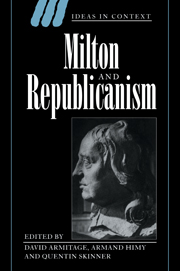Book contents
- Frontmatter
- Contents
- Notes on contributors
- Preface
- PART I DEFINING MILTON'S REPUBLICANISM
- PART II MILTON AND REPUBLICAN LITERARY STRATEGY
- PART III MILTON AND THE REPUBLICAN EXPERIENCE
- PART IV MILTON AND THE REPUBLICAN TRADITION
- 12 The Whig Milton, 1667–1700
- 13 Borrowed language: Milton, Jefferson, Mirabeau
- Index
- Recent titles in the series include
12 - The Whig Milton, 1667–1700
Published online by Cambridge University Press: 27 October 2009
- Frontmatter
- Contents
- Notes on contributors
- Preface
- PART I DEFINING MILTON'S REPUBLICANISM
- PART II MILTON AND REPUBLICAN LITERARY STRATEGY
- PART III MILTON AND THE REPUBLICAN EXPERIENCE
- PART IV MILTON AND THE REPUBLICAN TRADITION
- 12 The Whig Milton, 1667–1700
- 13 Borrowed language: Milton, Jefferson, Mirabeau
- Index
- Recent titles in the series include
Summary
The Whig Milton is first of all the Milton of the prose works. In the last decades of the seventeenth century, Whigs found sustenance especially in his assaults on the sacerdotal view of kingship, and also in his pleas against the licensing of the press and in his anti-clerical arguments for a Protestant toleration. One great figure after another in the Whig tradition drew on Milton for inspiration and instruction. James Tyrrell, John Locke, Algernon Sidney, John Toland, John Dennis, Daniel Defoe, the Third Earl of Shaftesbury, Joseph Addison: these and many less-remembered Whigs read Milton's works with interest and often with approval. Their reading was selective, however, and would only slowly lead to a richer valuation of his achievement. The sacrilege of Milton's Eikonoklastes and Defensio – books proscribed and publicly burnt at the Restoration – made him so notorious that he often went unnamed by Whigs, even when his arguments and rhetoric were useful to them in late seventeenth-century controversy. They sometimes thrilled to his determined republicanism, but they were more often embarrassed by it. Tories were eager to discover his presence in their opponents’ writings and to tar them with his notoriety. Not all Whigs were alike, moreover, nor was their response to Milton. The growth of party featured tensions and eventually schisms that add to the complexity and diminish the coherence of the Whig ‘tradition’, especially after the Revolution of 1688–9. The name ‘Whig’ needed more and more stretching to cover divergent points of view. This led to a corresponding variety in appraisals of Milton's works and reputation.
- Type
- Chapter
- Information
- Milton and Republicanism , pp. 229 - 253Publisher: Cambridge University PressPrint publication year: 1995
- 60
- Cited by



